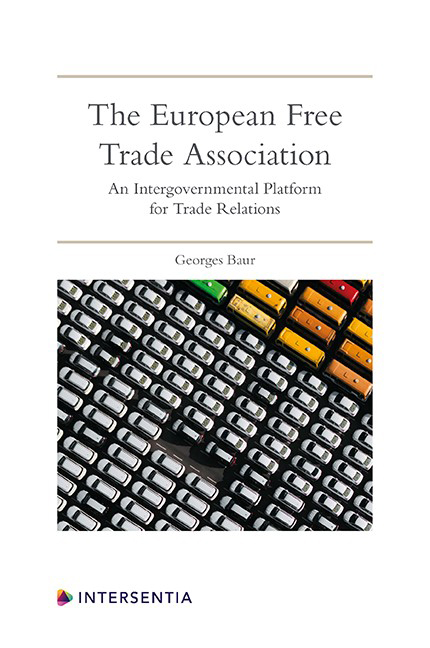Book contents
- Frontmatter
- Foreword
- Preface
- Acknowledgements
- Contents
- List of Tables and Figures
- Chapter 1 What is EFTA?
- Chapter 2 Short Historical Overview
- Chapter 3 Substantive Fields of Activity of EFTA
- Chapter 4 EFTA Institutions, Membership, Scope and Other General Provisions
- Chapter 5 Trade Relations with Third Countries and Groups of Countries
- Chapter 6 The Relations between the EFTA States and the EU/EEA
- Chapter 7 Conclusion: EFTA Membership for the UK Post-Brexit?
- Convention Establishing the European Free Trade Association
- Annex K. Free Movement of Persons (Chapter VIII)
- Annex T. Arbitration (Art. 48)
- Index
- About the Author
Chapter 4 - EFTA Institutions, Membership, Scope and Other General Provisions
Published online by Cambridge University Press: 21 July 2020
- Frontmatter
- Foreword
- Preface
- Acknowledgements
- Contents
- List of Tables and Figures
- Chapter 1 What is EFTA?
- Chapter 2 Short Historical Overview
- Chapter 3 Substantive Fields of Activity of EFTA
- Chapter 4 EFTA Institutions, Membership, Scope and Other General Provisions
- Chapter 5 Trade Relations with Third Countries and Groups of Countries
- Chapter 6 The Relations between the EFTA States and the EU/EEA
- Chapter 7 Conclusion: EFTA Membership for the UK Post-Brexit?
- Convention Establishing the European Free Trade Association
- Annex K. Free Movement of Persons (Chapter VIII)
- Annex T. Arbitration (Art. 48)
- Index
- About the Author
Summary
INTRODUCTION
After having dealt with the substantive provisions of the EFTA Convention in the previous chapter, there are, of course, other provisions that it is worthwhile describing. This chapter will begin with the more general provisions, such as the nature of EFTA and its territorial scope, but also those provisions on accession and association and withdrawal. Finally, this chapter will look at EFTA's institutions and procedures.
NATURE AND TERRITORIAL SCOPE
The nature of EFTA is that of an intergovernmental organisation. Hence, it is quite different in scope from, e.g., the EU. It was deliberately chosen to be different as many of its members could not agree with the then EEC's supranational tendency and political aims. The EFTA states have not surrendered any of their sovereignty to the Association or any institutions thereof. EFTA does not have legal personality like the EU. Nevertheless, it enjoys diplomatic immunity and so do part of the staff of the EFTA Secretariat, the EFTA Surveillance Authority and the EFTA Court according to seat agreements with Switzerland, Belgium and Luxembourg.
The Convention is applicable to the territories of the EFTA states, 3 thus defining the territorial scope. Exceptions are mentioned in Annex U. According to that protocol the Kingdom of Norway was given the right to exempt the territory of Svalbard (Spitzbergen) from the application of the Convention with the exception of trade in goods when ratifying the Agreement amending the Convention establishing the European Free Trade Association of 21 June 2001.
Norway exercised its right. Therefore, the EFTA Convention does not apply to the territory of Svalbard, with the exception of Articles 3 through 11. Given the special status of the archipelago under international law, the respective provision further states:
’ 2. In the event of a conflict between the Treaty Regulating the Status of Spitzbergen and Conferring the Sovereignty on Norway, done at Paris, 9 February 1920 (the “ Spitzbergen (Svalbard) Treaty “ ) and this Agreement, the Spitzbergen (Svalbard) Treaty shall prevail to the extent of the conflict, without prejudice to the positions of the Parties in respect of the Spitzbergen (Svalbard) Treaty. In the event of such conflict or a dispute as to whether there is such conflict or as to its extent, the dispute settlement provisions of this Agreement shall not apply. ‘
- Type
- Chapter
- Information
- The European Free Trade AssociationAn Intergovernmental Platform for Trade Relations, pp. 55 - 84Publisher: IntersentiaPrint publication year: 2020



